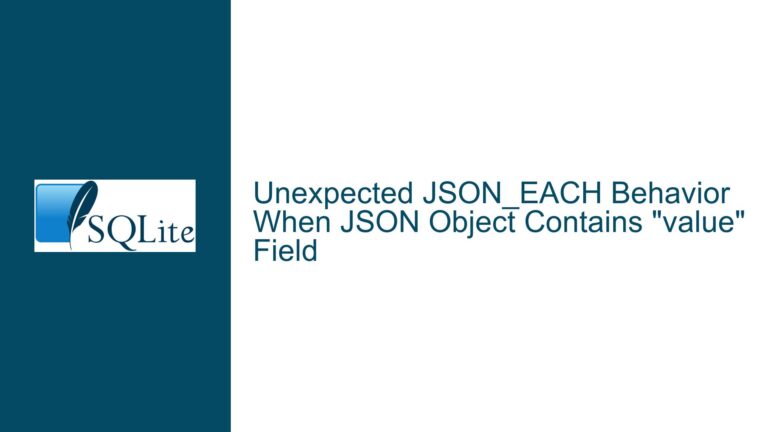SQLite UPSERT Issue with Generated Columns Leading to Unexpected NULL Values
UPSERT Operation Fails to Update Column Due to Generated Column Order
The core issue revolves around the behavior of the UPSERT operation in SQLite when dealing with tables that contain generated columns. Specifically, when performing an INSERT ... ON CONFLICT DO UPDATE operation (commonly referred to as UPSERT), the column being updated is unexpectedly set to NULL instead of the intended value. This behavior is directly tied to the order in which the generated columns are defined in the table schema.
In the provided example, a table named tab is created with a primary key column prim, two integer columns a and b, and a generated column comp which is derived from column a. When an UPSERT operation is performed to update the value of column b, the value is set to NULL instead of the expected value of 5. However, when the table schema is modified so that column b is defined before the generated column comp, the UPSERT operation behaves as expected, updating column b to the correct value.
This issue highlights a subtle but significant interaction between generated columns and the UPSERT operation in SQLite. Generated columns, which are computed based on other columns in the table, can interfere with the expected behavior of UPSERT operations, particularly when the order of column definitions in the table schema is not carefully considered.
Generated Column Evaluation Interfering with UPSERT Logic
The root cause of this issue lies in the way SQLite evaluates generated columns during an UPSERT operation. When a table contains generated columns, SQLite must compute the values of these columns during the insertion or update process. The order in which columns are defined in the table schema affects the sequence in which these computations are performed, which in turn can impact the behavior of the UPSERT operation.
In the problematic table schema, the generated column comp is defined before column b. During the UPSERT operation, SQLite attempts to update column b using the value from the excluded virtual table, which represents the values that would have been inserted if the conflict had not occurred. However, due to the presence of the generated column comp, SQLite’s internal logic may incorrectly evaluate the state of the row, leading to the unexpected NULL value in column b.
When the table schema is modified so that column b is defined before the generated column comp, the evaluation order changes. In this case, SQLite correctly processes the update to column b before computing the value of the generated column comp, resulting in the expected behavior.
This behavior suggests that the interaction between generated columns and UPSERT operations in SQLite is sensitive to the order of column definitions in the table schema. This sensitivity can lead to unexpected results if the schema is not carefully designed to account for the evaluation order of generated columns.
Resolving the Issue by Adjusting Column Order and Updating SQLite
To address this issue, there are two primary approaches: adjusting the order of column definitions in the table schema and ensuring that the SQLite version being used is up to date.
Adjusting Column Order in the Table Schema
One effective solution is to modify the table schema so that non-generated columns that are likely to be updated via UPSERT operations are defined before any generated columns. This ensures that the evaluation of generated columns does not interfere with the UPSERT logic. In the example provided, moving column b before the generated column comp resolves the issue:
CREATE TEMPORARY TABLE tab (
prim DATE PRIMARY KEY,
a INTEGER,
b INTEGER,
comp INTEGER AS (a)
);
By defining column b before the generated column comp, SQLite processes the update to column b before computing the value of comp, ensuring that the UPSERT operation behaves as expected.
Updating to the Latest SQLite Version
Another important step is to ensure that the SQLite version being used is up to date. The issue described in the example was identified as a bug in SQLite version 3.32.1, and a fix was implemented in subsequent versions. Updating to the latest version of SQLite, or at least to a version that includes the fix, will prevent this issue from occurring.
To check the current version of SQLite, you can use the following command:
SELECT sqlite_version();
If the version is older than 3.32.1, it is recommended to update to the latest version available. The latest version can be downloaded from the official SQLite website.
Implementing PRAGMA journal_mode for Data Integrity
In addition to the above solutions, it is also advisable to ensure that the database is configured to handle unexpected interruptions, such as power failures, which could lead to data corruption. One way to enhance data integrity is by using the PRAGMA journal_mode command to enable write-ahead logging (WAL) mode:
PRAGMA journal_mode=WAL;
WAL mode provides better concurrency and can help prevent data corruption in the event of a crash. While this does not directly address the UPSERT issue, it is a good practice to ensure the overall stability and reliability of the database.
Testing and Validation
After implementing the above solutions, it is important to thoroughly test the database to ensure that the issue has been resolved. This includes performing UPSERT operations on tables with generated columns and verifying that the expected values are correctly updated. Additionally, it is recommended to review the table schema and ensure that the order of column definitions is optimized to prevent similar issues in the future.
Conclusion
The issue of UPSERT operations resulting in unexpected NULL values in SQLite when dealing with generated columns is a nuanced problem that requires careful consideration of the table schema and the version of SQLite being used. By adjusting the order of column definitions and ensuring that the latest version of SQLite is installed, this issue can be effectively resolved. Additionally, implementing best practices such as enabling WAL mode can further enhance the stability and reliability of the database.
Understanding the interaction between generated columns and UPSERT operations is crucial for database developers working with SQLite. By being aware of these nuances and taking proactive steps to address potential issues, developers can ensure that their databases function as intended and avoid unexpected behavior that could lead to data inconsistencies.






